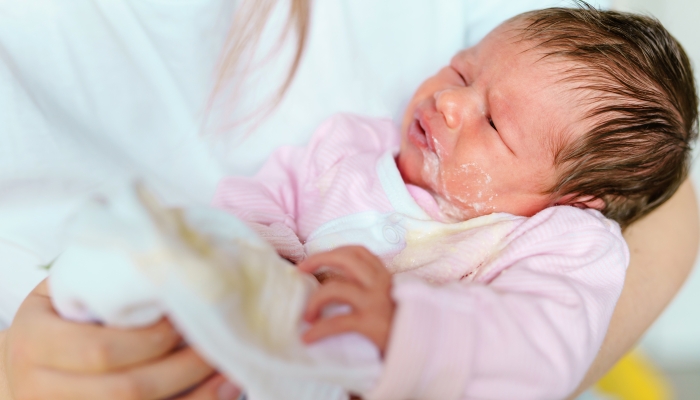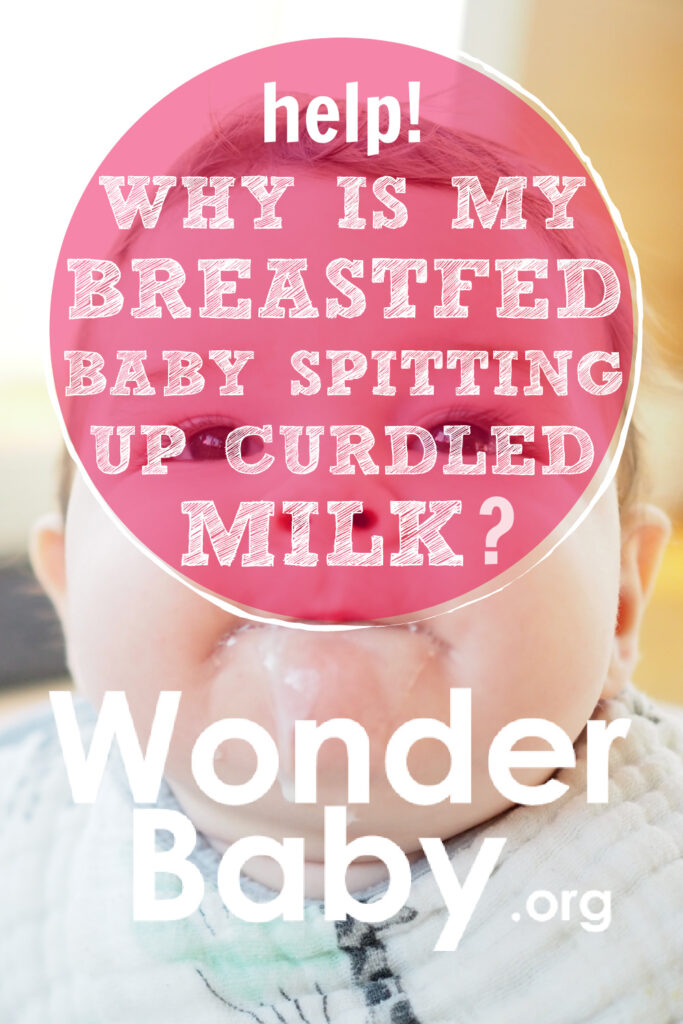Help! Why Is My Breastfed Baby Spitting up Curdled Milk?

- It is completely normal for young babies to spit up several times each day.
- Breast milk curldles quickly when mixed with stomach acid.
- Do not be alarmed by your breastfed baby’s curdled spit-up.
- See your doctor if your baby stops gaining weight or has very few wet diapers.
- Holding your baby upright and burping them frequently can help prevent excessive spit-ups.
Most parents plan for a little spit-up when their baby comes into the world. New moms and dads carry around diaper bags full of burp cloths, wipes, and outfit changes. Although you know that babies spit up, you might be surprised at both the amount and appearance of baby spit-up.
Baby spit-up can come in many different colors and textures, making it difficult to tell what is normal and what is not. You may wonder why your breastfed baby is spitting up curdled milk and if this is unusual or cause for alarm.
Breastfed Baby Spitting up Curdled Milk: Is It Normal?
Both breastfed babies and formula-fed babies commonly spit up. In fact, the experts at American Family Physician state that over half of all newborns spit up at least once per day. Spit-up in babies tends to peak around 4 months, and most babies grow out of it by the time they reach their first birthday.
While it looks and smells bad, spitting up curdled breast milk is completely normal.
Reasons Why Babies Spit Up Curdled Milk
When breast milk enters your baby’s tummy, it curdles. Because your baby has an immature digestive system, their stomach contents frequently come back up out of their mouth (or even their nose). Sometimes, those stomach contents include curdled breast milk.
Some babies are more likely to spit up curdled milk than others. A few possible reasons for excess spit-up milk include:
1. Too Much Milk Flow
Forceful letdown or a bottle with a fast-flowing nipple can cause your baby to drink too much, too fast. When a newborn baby’s stomach gets too full after breast or bottle feeding, their stomach fluids are more likely to come back up through their mouth.
2. Swallowing Air
Similarly to drinking too much too fast, if a baby swallows air while eating, their stomach will fill and the contents will come back up. Swallowing air can be caused by problems with bottle feeding or a poor latch.
3. Acid Reflux
While frequent spitting up is normal, some babies experience excessive spitting up due to acid reflux. If your baby refuses feedings, acts fussy during and immediately after feedings, or is irritable and fussy throughout most of the day, they may be struggling with severe acid reflux.
4. Tounge Tie
According to the International Journal of Clinical Pediatrics, children with a tongue tie are more likely to have problems with spitting up. This is primarily because they have a hard time getting a good seal on a breast or bottle nipple and end up swallowing a lot of air.
5. Allergic Reaction to Milk
The Mayo Clinic states that cow’s milk allergy is one of the most common food allergies in children and studies show that milk allergies “can occur in both formula-fed and exclusively breastfed infants.” Breastfed babies with a cow’s milk allergy may experience vomiting, diarrhea, hives, and even anaphylaxis. If your baby has a severe cow milk allergy, you will have to avoid drinking regular milk until you are finished breastfeeding.
6. Pyloric Stenosis
While uncommon, pyloric stenosis is one of the few possible reasons that your baby spits up excessively. Pyloric stenosis is a condition where the stomach contents cannot empty into the small intestine, forcing them to come back up through the mouth.
Pyloric stenosis can cause weight loss and dehydration and is treated surgically.
What to Do if Your Breastfed Baby Spits Up Curdled Milk
If your baby spits up curdled milk, do the same things you would do for normal baby spit-up. Simply hold your baby in an upright position until they have finished spitting up, give them a rest, and try to burp them.
It is okay to give your baby more milk if they seem hungry after spitting up. Simply stop to let them frequently burp during their feeding.
As your baby’s digestive system matures and they start eating more solid foods, their spitting up should resolve on its own.
Tips on How to Prevent Your Baby From Spitting Up Curdled Milk
While spitting up is not usually a health risk, it can be uncomfortable for your baby and cause a big mess for you to clean up. There are a few things you can do to prevent your baby from spitting up so much curdled milk.
See a Lactation Consultant
A lactation consultant can help make sure that your baby’s mouth is in the correct position for a good latch, which can prevent swallowing air and reduce your baby’s spitting up.
Get a Slow-Flow Bottle
Similarly to having a good latch, a slow-flow bottle prevents your baby from swallowing too much air or drinking milk too quickly.
Hold Your Baby Upright
Hold your baby upright for about 30 minutes after each feeding to allow gravity to keep your baby’s acidic stomach fluid moving in the right direction.
Burp Your Baby Frequently
Your baby’s body may need extra time to digest their food and a little help relieving gas trapped in the belly. Many babies need to be burped two or three times during each feeding session.
Lay Your Baby on Her Left Side
It may reduce spit-up frequency to let your baby rest on his or her left side. Only lay your baby on their side with direct supervision. If you cannot keep your eyes on your baby, lay them flat on their back to reduce the risk of sudden infant death syndrome.
When to See a Doctor if Your Baby Is Spitting Up Curdled Milk
While it is normal for young babies to spit up, make sure you can spot the difference between normal spit-up and vomiting. If your baby exhibits any of the following symptoms, make an appointment with your medical doctor right away.
Projectile vomiting
Forceful vomiting or vomit accompanied by crying is not normal. If your baby seems uncomfortable when they spit up, they may be experiencing a gastrointestinal illness.
Vomit that looks like coffee grounds
Spit-up or vomit that looks like coffee grounds may actually be dried blood. If your baby spits up fluid with a coffee ground appearance, is pink, or bright red, take them to the pediatrician right away.
Losing weight
Newborn babies should double their birth weight by 5 months of age and triple it by one year. If your baby is losing weight while spitting up frequently, they may have a problem with their digestion.
Difficulty breathing
Severe acid reflux may cause wheezing, coughing, or difficulty breathing. If your baby is wheezing or having trouble breathing, they need emergency medical care immediately.
Fewer wet diapers than usual
If you are worried that your baby is spitting up too much, keep an eye out for signs of dehydration. Signs of dehydration include having fewer wet diapers than usual, crying without tears, and dry mouth.
FAQs
What makes a baby spit up curdled milk?
Just like it does when sitting out in warm temperatures, milk curdles when mixed with stomach acid. Because babies have immature digestive systems, they frequently experience normal spitting up. Spitting up curdled milk is just a normal part of newborn life.
Is it okay to feed a baby after spitting up curdled milk?
It is okay to feed your baby after they spit up curdled milk. If your baby does spit up, give them a break from feeding and burp them. If they still seem hungry, it is okay to feed them again.
Can spitting up curdled milk cause my breastfed baby to become dehydrated?
Usually, spitting up does not cause problems with dehydration or weight loss. However, if your baby is spitting up excessively, they may become dehydrated. If your baby has fewer wet diapers than usual, is not gaining weight, or is crying with no tears, it might be time to see your child’s doctor to discuss their condition.
Is it safe to lay my baby down immediately after feeding if they are spitting up curdled milk?
It is always a good idea to hold your baby in a more upright position for 30 minutes after a feeding, especially if they are spitting up. Babies are more likely to have problems with spit up if they are laid flat immediately after a feeding.
Can stress or anxiety in the mother affect the quality of breast milk and cause the baby to spit up curdled milk?
Stress and anxiety may affect breast milk quantity, but there is no evidence to show that it affects breast milk quality. Breast milk from stressed or anxious mothers is not more likely to cause baby’s spit up than breast milk from mothers who are less anxious.
References
- Burris AD, Burris J, Järvinen KM. Cow’s Milk Protein Allergy in Term and Preterm Infants: Clinical Manifestations, Immunologic Pathophysiology, and Management Strategies. Neoreviews. 2020 Dec;21(12):e795-e808. doi: 10.1542/neo.21-12-e795. PMID: 33262206.
- Mayo Clinic. Milk allergy: Symptoms and causes. Mayo Clinic website. Updated May 6, 2021. Available from: https://www.mayoclinic.org/diseases-conditions/milk-allergy/symptoms-causes/syc-20375101
- Mayo Clinic. Pyloric stenosis: Symptoms and causes. Mayo Clinic website. Updated March 24, 2021. Available from: https://www.mayoclinic.org/diseases-conditions/pyloric-stenosis/symptoms-causes/syc-20351416
- Mehta S, Goldman RD. Exclusive breastfeeding: overcoming challenges. Am Fam Physician. 2015 Oct 15;92(8):705-6. Available from: https://www.aafp.org/pubs/afp/issues/2015/1015/p705.html
- Siegel, S. Aerophagia Induced Reflux in Breastfeeding Infants With Ankyloglossia and Shortened Maxillary Labial Frenula (Tongue and Lip Tie). International Journal of Clinical Pediatrics, North America, 5, apr. 2016. Available from: https://theijcp.org/index.php/ijcp/article/view/246

The information WonderBaby provides is not intended to be, and does not constitute, medical or other health advice or diagnosis and should not be used as such. Always consult with a qualified medical professional about your specific circumstances.
Related Posts

Breastfeeding, Sleep
Sleep and Breastfeeding: A Comprehensive Guide for Nursing Moms
Many people assume breastfeeding and sleep training don’t go together, but it is possible to help your baby sleep better while continuing your breastfeeding journey.

Breastfeeding
Comfort Nursing: Pros, Cons, and How to Stop
Find out what comfort nursing is, when should you worry about it, and how to stop or limit your baby's comfort nursing (especially at night!).

Breastfeeding, Product Reviews
5 Best Breastfeeding Chairs for Nursing Moms of 2023
Whether you want a gentle rock, a smooth glide, or a cozy cuddle to soothe your baby to sleep, you’ll have your pick of the best breastfeeding chairs on the...